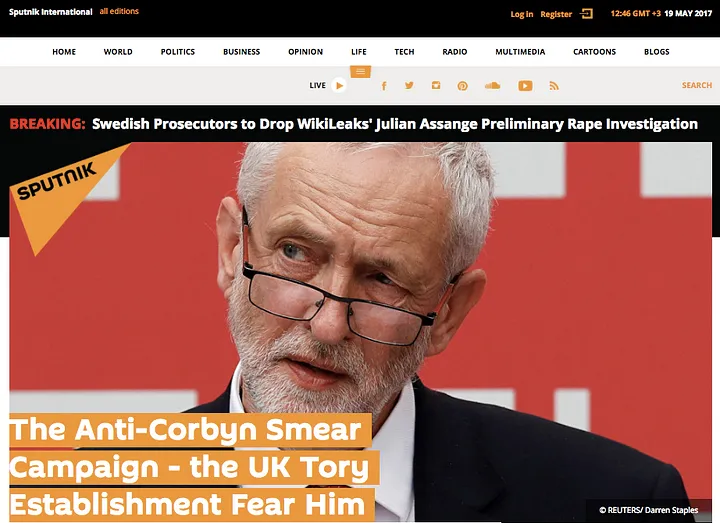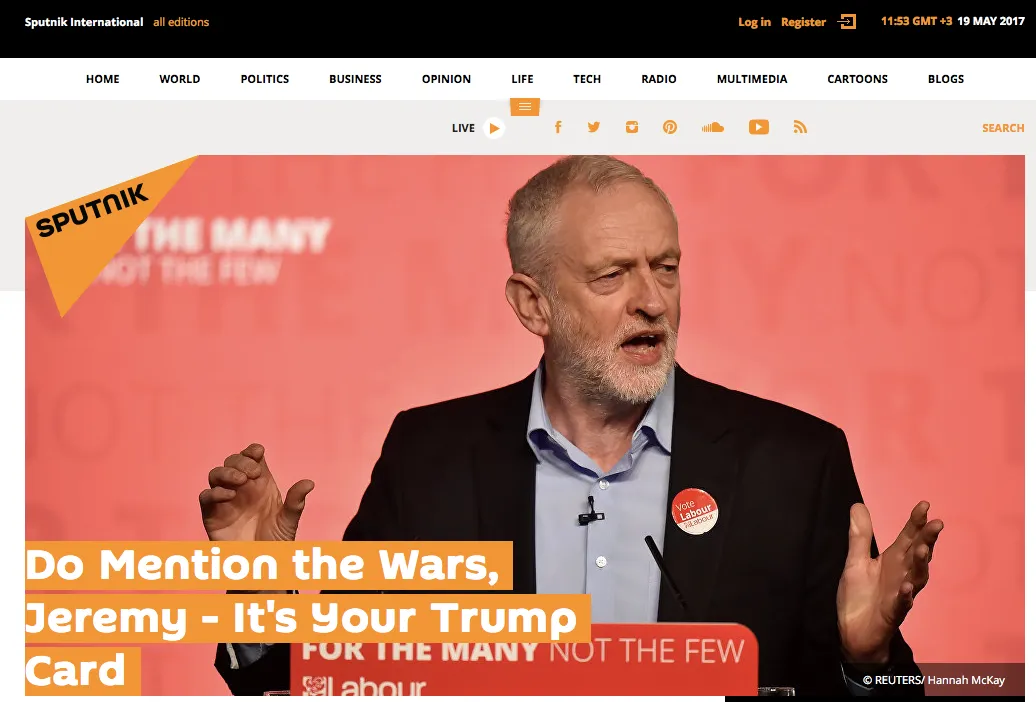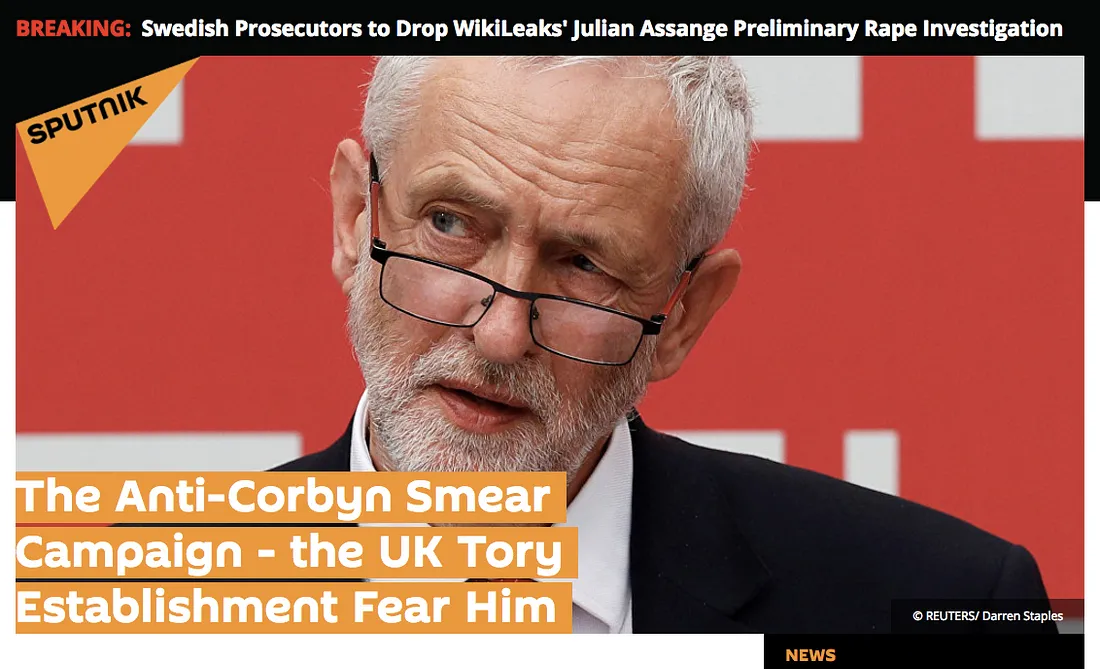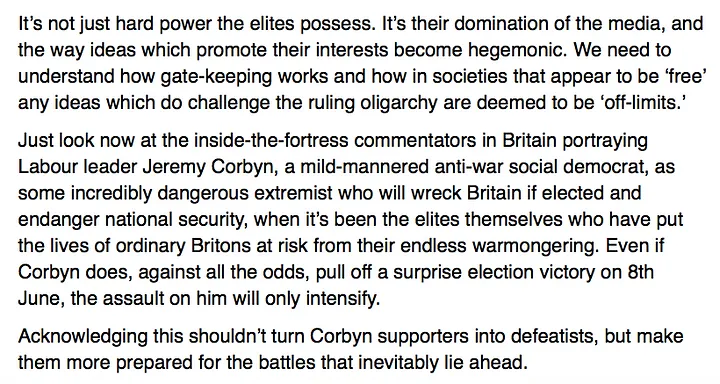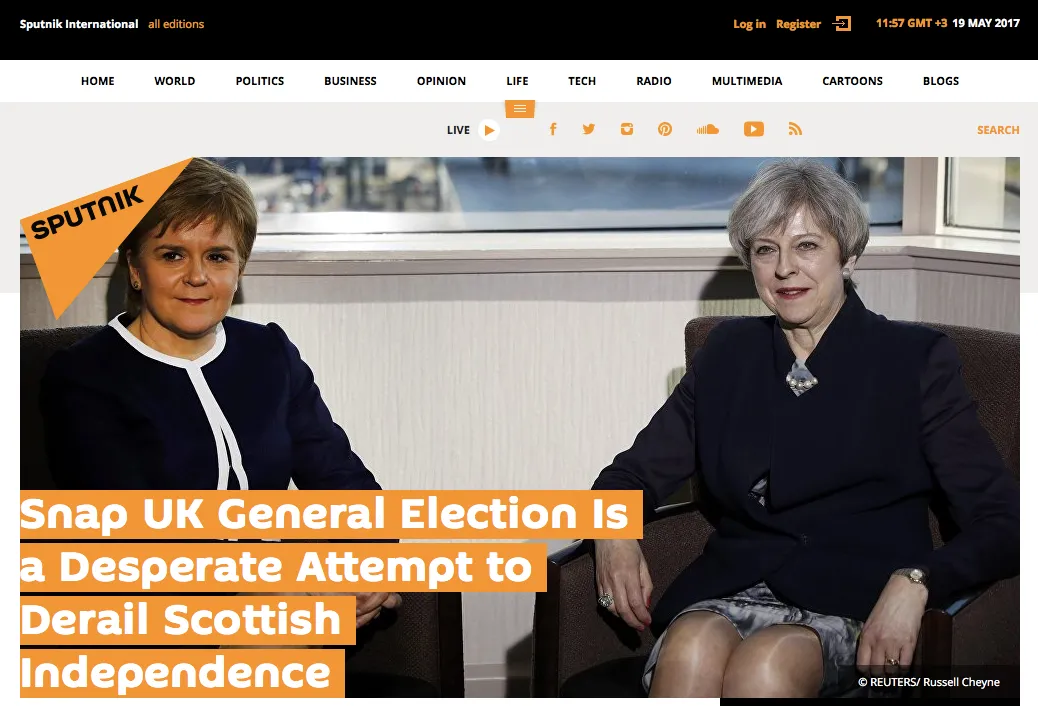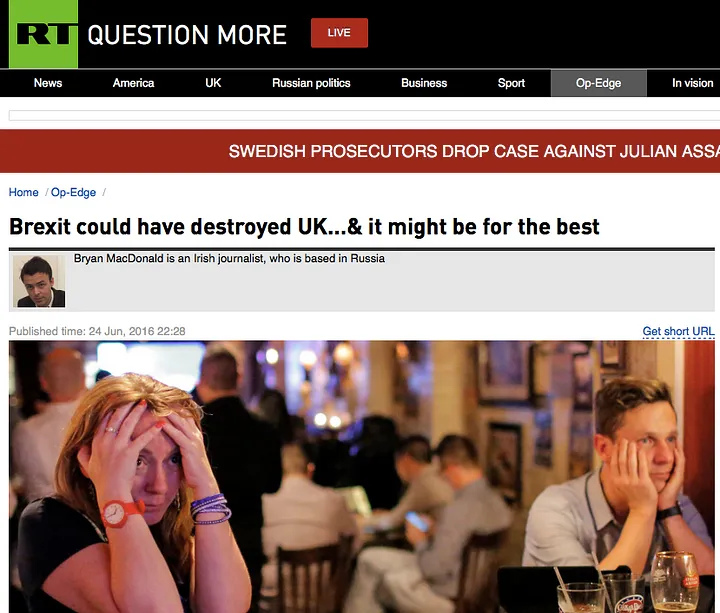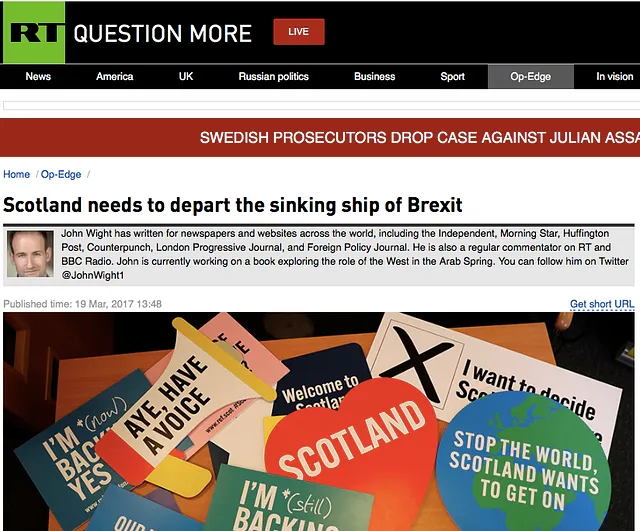Is the Kremlin Amplifying Pro-Corbyn, Anti-UK Views?
Analyzing RT and Sputnik editorials on UK politics
Is the Kremlin Amplifying Pro-Corbyn, Anti-UK Views?
Share this story
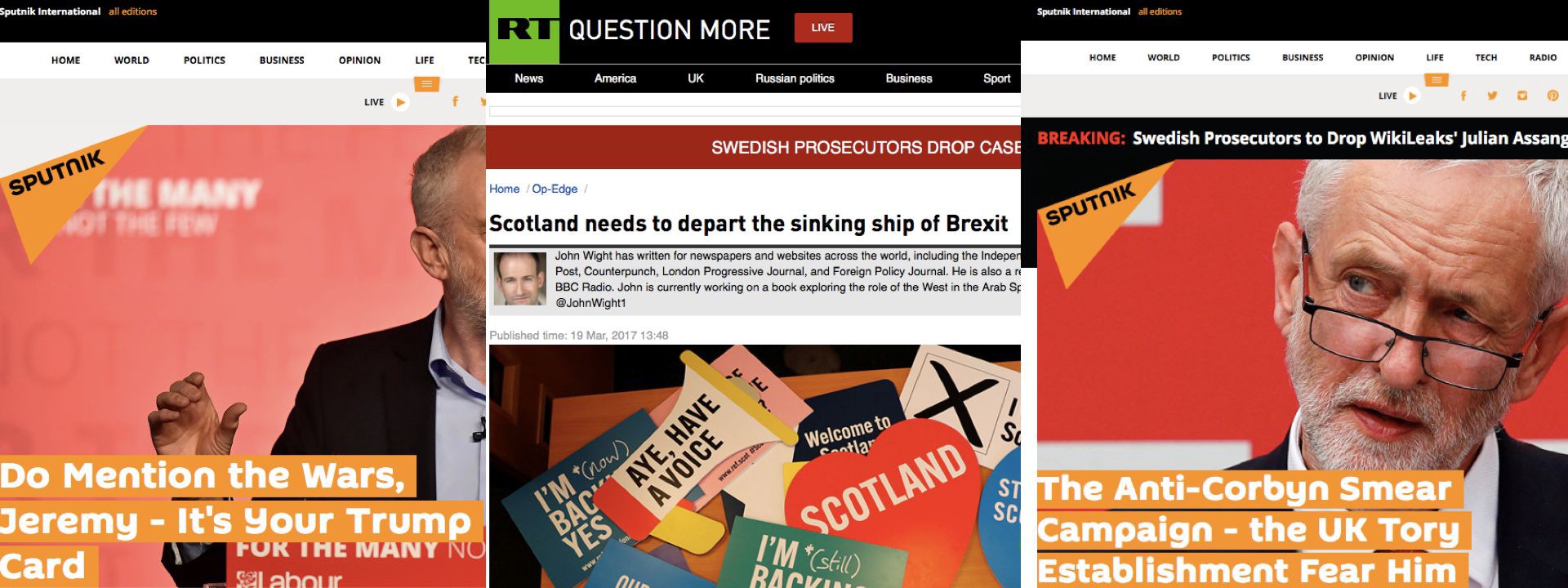
BANNER: Editorial headlines from RT and Sputnik since the UK election was called
As the United Kingdom heads for a snap general election on June 8, the Kremlin’s English-language broadcasters appear to be providing a partisan platform for commentators who support opposition leader Jeremy Corbyn and call for Scotland to leave the United Kingdom.
In the month after Prime Minister Theresa May called for the election on April 18, editorials published by RT and Sputnik offered Corbyn praise and advice, while criticizing May. Over the past twelve months, they repeatedly criticized the UK government’s relationship with Scotland and called for Scottish independence. These opinion pieces vastly outweighed any pieces arguing against Corbyn, or in favor of May or of Scotland’s continued presence in the United Kingdom.
The UK election has seen plenty of partisan coverage from independent and commercial media. However, RT and Sputnik are public service, state-funded broadcasters, not independent or commercial media. As such, they should provide impartial and balanced coverage.
This does not mean that they cannot publish critical opinion pieces, but they should be even-handed in their criticism. Publishing editorials which systematically criticize one side, while praising the other, over a period of weeks or months, appears like blatant bias and could be viewed as interference in UK politics by the Russian state’s organs.
State outlets
RT and Sputnik were created in 2005 and 2013, and are funded by the Russian state. Both claim to be independent, with RT complaining on September 20, 2016, that it had been called “Kremlin-backed,” and protesting that it is “an autonomous non-profit organization, funded from the budget of the Russian Federation.”
The claim of editorial independence is deceptive. According to Margarita Simonyan, chief editor of both outlets, in a comment published by state news wire RIA Novosti in June 2005, “We want to reflect Russia’s opinion of the world and to make Russia clearer for understanding.”
According to the decree establishing Sputnik’s parent organization, the Rossiya Segodnya agency, its goal is “reporting the state policy of the Russian Federation, and public life in the Russian Federation, abroad.”
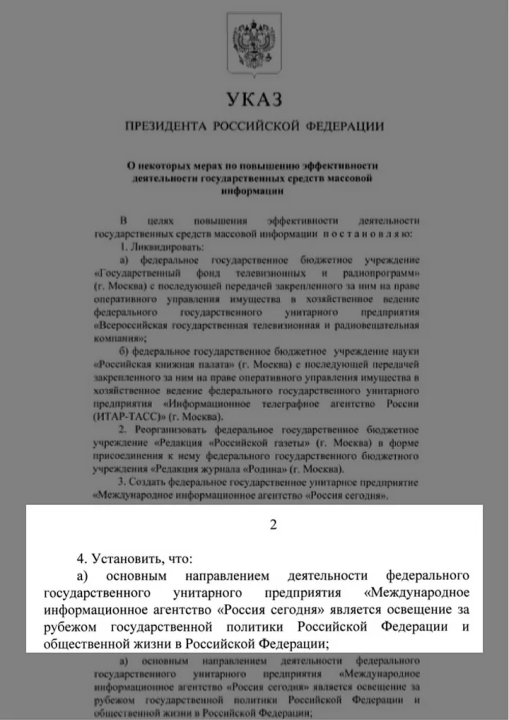
“Reflecting Russia’s opinion” and “reporting the state policy of the Russian Federation” are not the tasks of independent news agencies, but of official communications channels.
Their reporting is consistent with that view. It consistently reflects the Kremlin’s strategic narratives — for example, criticizing NATO and Ukraine, and attacking witnesses to possible Russian war crimes in Ukraine and Syria. RT has also been found guilty in the UK of violating journalistic impartiality standards in its coverage of Ukraine and Turkey at times when the Kremlin was at loggerheads with Kiev and Ankara.
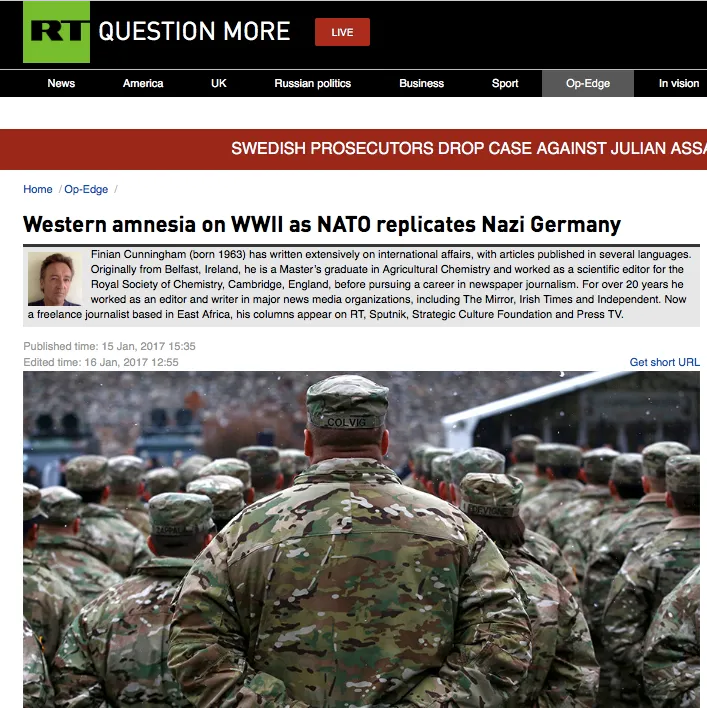
The evidence, therefore, indicates that neither RT nor Sputnik is an independent news outlet; rather, they are Russian government communication tools used to promote its policies.
Election coverage — Corbyn vs. May
To establish the two outlets’ approach to the UK election, the DFRLab analyzed their editorial references to May and Corbyn between April 18 and May 18. On Sputnik’s website, date-limited Google searches were conducted on the “Opinions” and “Columnists” sections; on RT’s site, on the “Op-Edge” section. In each case the search terms were “Jeremy” and “Theresa,” to avoid confusion with the many uses of the word “May.”
In the month since the election was called, Sputnik ran five editorials mentioning Corbyn. Two were penned by columnist Neil Clark, on April 19 and May 10; three were by editorialist John Wight, on April 21, May 12 and May 17.
Clark’s first editorial portrayed the Labour Party’s poor performance in opinion polls as “caused by the failure of Blairites and Brownites to accept leader Jeremy Corbyn’s democratic mandate,” said Corbyn “must” focus the election debate on issues other than Brexit, and added, “we need to reject Theresa May’s stated reason for calling the election.” This is openly partisan.
The second was even more direct, urging Corbyn to raise his opponents’ voting records on the Iraq War and other military interventions, and praising his judgment on foreign policy:
“Put succinctly, ‘Jezza’ has been in the right on foreign policy issues while his opponents, including the ‘strong and stable’ Tory leader Theresa May, have been spectacularly wrong.”
Wight was similarly partisan. His first reaction to May’s decision, on April 21, largely focused on Scottish independence, but characterized her call for an election as “bearing all the hallmarks of a government in the throes of a continuing political crisis,” and described her as “without (…) any democratic mandate from the British electorate.”
On May 12, in an essay on Marxism, he accused the “establishment in Britain” of “slandering and attacking” Corbyn, before stating that, “Theresa May and the Tories have more in common with Marx than Corbyn does, considering the class war they have unleashed against working people under the rubric of austerity — rolled out in response to the 2007–08 economic crisis and which has more to do with ideology than economics.”
Five days later, he accused the media of an “anti-Corbyn smear campaign,” characterizing the Labour leader’s manifesto in terms which echoed its own headline, “For the many not the few”:
“Corbyn is determined to reverse this dismal trend, to place a priority on the needs and interests of the many and not the few. He is committed to taxing the rich while bolstering the incomes of the poor, not merely on the grounds of morality but also in the interests of a stagnant economy.”
In the same period, seven Sputnik opinion pieces mentioned Theresa May. Five of those editorials were the Wight and Clark pieces cited above, all hostile to May.
Of the other two, the first, published on April 25, focused on the UK’s industrial future and mentioned May neutrally. The second — again by Wight — focused on the UK’s Brexit negotiations, but castigated May as “led by an unholy alliance comprising the anti-Europe wing of her own party, the far-right anti-EU party of UKIP, and a feral right-wing media that will accept nothing less than a hard Brexit (…) The result is an astonishing exercise in political and economic denial over what Brexit will entail.”
Each piece came with a disclaimer: “The views expressed in this article are solely those of the author and do not necessarily reflect the official position of Sputnik.” This is a valid comment for a single article; but Sputnik ran seven, all but one of them taking the same partisan line. Regardless of Sputnik’s official position, its behavior is one-sided.
RT was less outspoken on the election issue. Not one article in its “Op-Edge” opinion section since April 18 dealt with the election directly. Only three editorials mentioned Corbyn; two mentioned May.
Those editorials were written, again, by John Wight (on April 26) and Neil Clark (on April 22, April 25 and April 29), together with Irish commentator John Lee (on May 1).
Clark’s piece on April 25 accused the “elite” of smearing Corbyn, whom he portrayed as a “mild-mannered anti-war social democrat,” and advised his followers not to lose heart:
His piece on April 29 mocked May’s election slogan of “strong and stable government,” characterizing her as “British Prime Minister Theresa May — who says (at least ten times a day) that she supports a ‘strong and stable government’ in the UK.” His piece on April 22 endorsed Corbyn’s call for demilitarized borders in Eastern Europe.
Wight’s piece attacked the BBC for questioning Corbyn on his readiness to use nuclear weapons:
“The problem, ultimately, is not that Jeremy Corbyn is weak on defense, as the outrageous question asked of him by the BBC’s Andrew Marr inferred. The problem is that journalists such as Andrew Marr have signed up to the lie that strong leadership is coterminous with the willingness to launch nuclear weapons, unleash carnage and mayhem, and turn the world upside down.”
Lee’s article dealt largely with the war of words between the UK and EU over Brexit, accusing the EU of treating May with “haughty arrogance,” but it also warned that “the Labour heartlands in the north, allied with anti-Brexit sentiment in London, might deal [May] a blow she is not expecting,” and concluded, “May is getting a taste of EU steel. But she is weak, she only wants to get out.”
These articles are not as outspoken as the Sputnik editorials; but their tone (and authors) are consistent. Their portrayal of Corbyn is sympathetic; their portrayal of May, such as it is, is hostile.
Scottish independence
Since the election was called, two opinion pieces — one each on RT and Sputnik —have touched on Scottish independence. Both were by Wight, both came out on April 21, and both were outspokenly pro-independence.
His initial reaction to the election call was his Sputnik editorial on April 21, which called the vote a “desperate attempt to derail Scottish independence” and blamed the situation entirely on May:
“Unfortunately, the Scottish First Minister’s attempts to arrive at any such compromise deal with Britain’s Prime Minister have all been unceremoniously rebuffed, sacrificed to the interests of the anti-Europe wing of Theresa May’s Tory Party and a feral EU-hating right-wing media in England.”
The same day, RT published a Wight editorial commenting on the suggestion that the UK should strip the wife of Syrian President Bashar al-Assad of her British citizenship:
“Another important aspect of this issue is the inference that British citizenship is some kind of privilege to be cherished. (…) There are millions of people in Scotland and Northern Ireland who would like nothing better than to be divested of this particular privilege, and with good reason. Indeed what is support for Scottish independence if not opposition to the semi-feudal institutions and, with them, the mentality of the British state and its ruling elite?”
Taken alone, these articles are not enough to establish a broader editorial stance. However, a wider examination reveals that they are part of a pattern.
A Google search for the terms “Scotland” and “independence” on RT’s Op-Edge page for the year from May 19, 2016 to May 18, 2017 returned nine editorials. Of those, five mentioned Scotland only in passing; the sixth was the Wight piece on Assad’s wife.
The seventh, by Russia-based Irish writer Bryan MacDonald, was published on June 24, the day after the Brexit vote, and opened, “It looks increasingly possible that Brexit will lead to the demise of the United Kingdom. That may be for the best.”
The last two were both, again, by Wight. After the Brexit vote, in June 2016, he headlined that “As Britain exits EU, time for Scotland to exit UK,” pointing out that “the one ray of hope from all this [Brexit] is the very real prospect of an independent Scotland, perhaps followed or joined by a united Ireland, and the break up of the UK.”
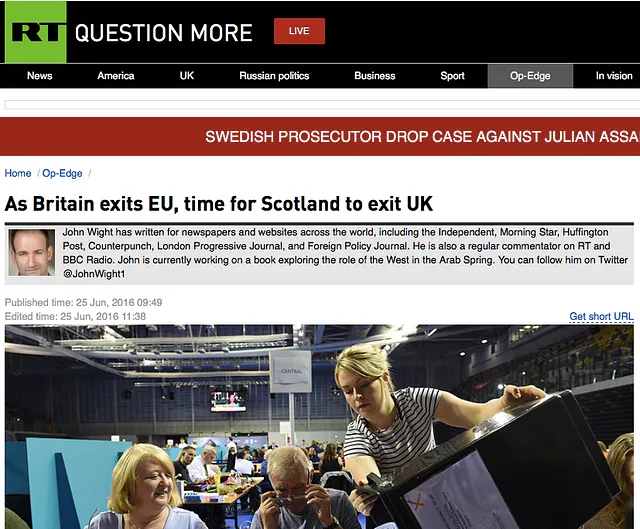
He continued, “Speaking personally, as someone who opposed Scottish independence in 2014, I am now unofficially one of its biggest supporters and advocates on the back of this referendum result.”
On March 19, he wrote that “Scotland needs to depart the sinking ship of Brexit,” arguing that “Scotland is a country where the dominant political current ensures that the hand of friendship is extended to migrants and refugees, unlike south of the border in England where a xenophobic, nativist, anti-migrant hysteria has taken root to the point where it is now driving the UK government’s path towards a so-called hard Brexit.”
A search on Sputnik’s “Opinion” page also returned nine results, six of which referred to Scotland only in passing. The other three were all editorials by Wight, and referred to Scots as being “forced out [of the EU] against their will and democratic choice,” (on September 7), and “ripped out of the single market against the will of its people” (October 26, and a similar phrase on January 25).
A column by Clark on March 8 reviewed (and largely repeated) a call by anti-globalization writer Kenneth Bell for Scotland to leave, not just the UK, but the EU: “With its oil and its fish, Scotland could become another Norway. But if the wrong choices are made, it could become the new Greece. Bell doesn’t go into this in his book — but perhaps it could be the theme of his next collection.”
Not one editorial found by these searches over a twelve-month period argued in favor of Scotland’s continued membership of the UK.
Partisan, not impartial
An opinion writer’s job is to be opinionated; the articles discussed above are consistent with that remit. Similarly, it is the job of the independent media to stimulate debate, including by publishing provocative opinions. The British domestic media are certainly not lacking in partisan voices of their own.
However, neither RT nor Sputnik is an independent media outlet. They are public broadcasters funded by the state budget of the Russian Federation. As such, their role should be to provide impartial coverage of the UK election and UK constitutional debates.
In fact, their editorials in the month since May called the election were systematically one-sided and partisan, supporting Corbyn against his opponents both in the Labour party and outside it and arguing in favor of Scottish independence.
The immediate purpose of this biased editorial stance is unclear. Much of the Scottish coverage pre-dates the call for an election; other editorials by Wight and Clark penned before the election period also took a broadly anti-Western line. As such, it may simply be a continuation of a long-standing policy to amplify criticism of Western politics, and divides within the UK.
Further, on May 19, Sputnik ran two more editorials. One, by Clark, continued the earlier tone, arguing that the Labour manifesto “offers hope of a better future for millions of ordinary Britons” while “the Tories have lurched still further to the hard right and their elite-friendly agenda could not be clearer.” The other, however, criticized Corbyn’s economic policies, saying they “put the UK economy at risk.”
It therefore remains to be seen whether the Kremlin outlets’ coverage will continue to push for Corbyn and Scottish independence, or take a more balanced stance.

